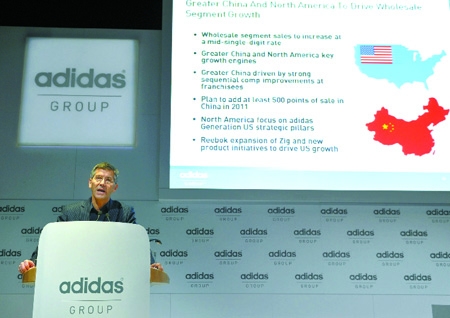Companies
Adidas fashions a new front in apparel
By Yu Tianyu (China Daily)
Updated: 2011-04-25 10:26
 |
Large Medium Small |
|
 |
|
Shoppers dash for bargains on Wednesday as the duty free store opens in Sanya, Hainan province.[Photo / China Daily] |
Sports goods maker takes on battle with rivals by aggressively beefing up its designer clothing
BEIJING - After years of fighting the big-name endorsements game with Nike and other budding local brands in the Chinese sports goods market, adidas AG has turned to fashion as its trump card to woo young, cash-rich consumers.
The world's second-largest sporting-goods maker after Nike seemed to lose direction in China when its sales were overtaken by Hong Kong-listed rival Li Ning Co Ltd in 2009.
| ||||
Instead of competing purely on technical matters and street credibility, adidas has been trying something different.
Colin Currie, managing director of adidas Group Greater China, said that China is a unique market in which the level of sports participation is relatively lower than in the US or European countries. However, Chinese consumers are very passionate about fashion.
"We have decided to put a big emphasis on the development of the adidas product line Sport Style to satisfy the fashion appetite of Chinese consumers," he said.
Currently, the company offers products from two different divisions across the globe: Sport Performance and fashion-driven Sport Style, with sub-brands of Originals, NEO, Y-3 and SLVR.
The market competition in China has become more complicated and broader, not only with old international rivals and local players, but also new fashion brands have created more pressure by squeezing market share, said Currie.
"I think that adidas' diverse product portfolio with professional sports technologies and experience would be our major advantage to maintain leadership," he added.
Erich Stamminger, a member of the executive board responsible for global brands at adidas Group, said: "From the court to the catwalk, the stadium to the street, we are giving an authentic statement with credibility that only adidas has."
The post-80s generation has become a major force driving consumption in China's urban areas, according to a survey by market research firm CTR.
A report by Bergstrom Consulting found that 15- to 25-year-olds in China want to be more individual and are far more fashion-conscious than their parents.
Currie said: "I think we are already a premium sports brand with a strong sense of fashion and taste to handle competition for young consumers in China, while adidas Sport Style is now a significant contributor to the group's development."
A 7-year cooperation with English fashion designer Stella McCartney has been well received by Chinese fashion-savvy consumers.
The feminine, tailored shapes of her designs are inspired by Stella's ready-to-wear signature, fused with modern fabrics that guarantee protection and comfort without compromising style.
The collection has been available in 31 outlets in 15 cities around the nation since the end of July 2010.
"With a dedicated fan base, Stella has attracted a lot of women consumers to adidas and made them aware of our full range of products," Currie said.
American designer Jeremy Scott, with his lively style, is also one of the fashion moguls involved with adidas.
He has brought additional, fresh elements to the adidas brand, helping it to find a direction in high fashion, Currie said.
Targeting the urban middle class, Y-3 is the result of a collaboration between adidas and the Japanese designer Yohji Yamamoto, representing the transformation of sportswear towards high-end designer apparel.
Adidas is also prepared to battle local sportswear brands, which offer consumers considerably lower prices.
According to the "50-yuan theory" developed by sports goods giant Nike, when the price difference between international brands such as Nike or adidas and local brands is about 50 yuan ($7.70) or so, Chinese consumers prefer to choose the international brand.
Established in 2007, adidas' sub-brand NEO is a sport-inspired brand for fashion-conscious youth. On average the products cost half of the adidas Sport Performance line and about 100 yuan more than local brands.
NEO has opened more than 600 stores in China. Herbert Hainer, chief executive officer of adidas Group, said previously that he hopes to open 200 more in the near future.
Hainer predicted NEO along with the other brands of adidas Sport Style would account for 30 percent of adidas' whole business in the coming five years.
Hainer also claimed that the revenue of adidas Sport Style line would achieve 21-percent growth in 2010, compared with the company's 15-percent rise in revenue globally.
Currie said: "We are quite open-minded to further cooperation with more fashion houses and designers. The partnerships are a result of understanding our consumers and how we can offer them more stylish products."
Having changed its slogan to "adidas is all in", the company launched its largest marketing campaign in history in late March in a bid to showcase all its product lines and get closer to its consumers.
Currie said that its business outlook in China is very optimistic and the company is planning to open 2,500 new outlets with most of them located in third- or fourth-tier cities.
By the end of 2010, adidas had opened 6,712 stores in China compared with 5,650 in 2009.
| 分享按钮 |



